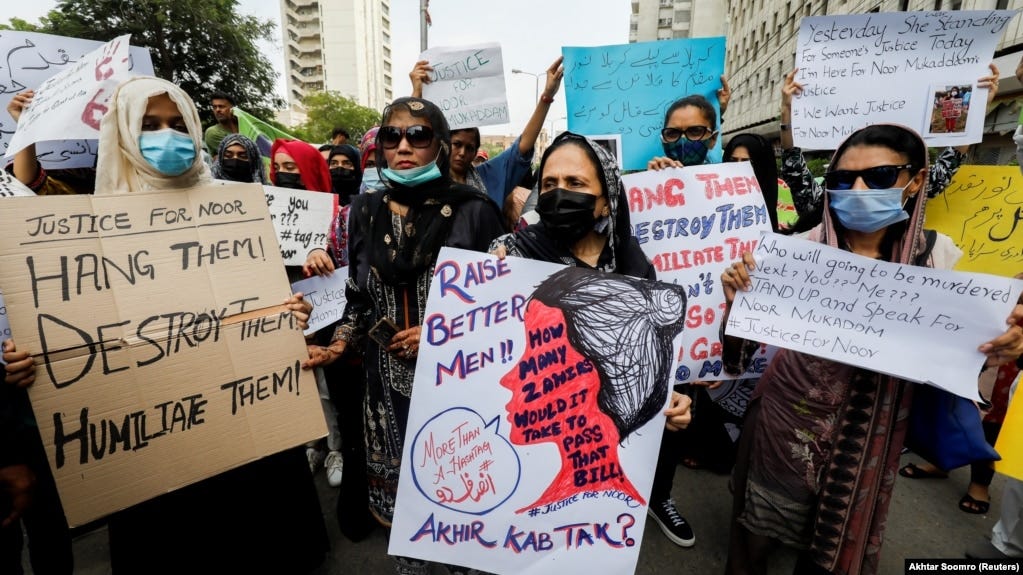Global Roundup: Kazakhstan GBV, Pakistan “Honor” Killings, Hong Kong LGBTQ Community, South African Women’s Artwork, Trans-Led Counselling
Curated by FG Contributor Samiha Hossain
Participants at the international Women's Day rally in Almaty, Kazakhstan, March 8, 2022. © 2022 Stanislav Beketov
CW: gender-based violence
Last month, Saltanat Nukenova’s husband, Kuandyk Bishimbayev, the former economy minister in Kazakhstan, was detained in connection with her death. Her death has sparked fresh calls for more to be done to tackle gender-based violence in Kazakhstan, which does not criminalize domestic violence as a standalone offence.
Saltanat’s death has created a media storm in Kazakhstan due in large part to her husband’s public profile. But there are many stories about women who are abused and even killed at the hands of violent partners. A situation that once again exposes the systemic nature of domestic violence in Kazakhstan, and how Kazakhstan’s laws, as well as the police and judiciary, fail to adequately protect women against family violence. Lawmakers have been considering the “partial criminalization of repeated “battery” and “light bodily harm”, offences commonly used in cases of family abuse, which were decriminalized in 2017.
In a video published after Saltanat’s death, athletes, artists, business people, bloggers, and lawyers called for tougher measures to address violence against women, including the “criminalization of domestic violence”. About 150.000 citizens have signed a petition proposing to recriminalize “battery” and “intentional infliction of light bodily harm.” Women’s rights lawyers and activists, and many others across the country, accentuated the urgent need to criminalize domestic violence. And a parliamentary deputy Zhuldyz Suleimenova, from the ruling Amanat party, has proposed criminalization of all forms of violence against women and children, and for the establishment of a separate authority to combat domestic violence.
A protest in the southern Pakistani seaport city of Karachi condemns violence against women. (file photo)
CW: gender-based violence
Each year, hundreds of women and girls are killed in Pakistan, often by relatives who say they are protecting the family's honor. In the latest case, police said they have charged a man for murdering his 18-year-old daughter on the orders of a jirga, or tribal council, because she had appeared in a photo with unrelated men on social media. The victim has been identified as Reema Bibi, whom police say was shot dead by her father in the family home last month, soon after photos of her with a woman and two men appeared on social media. Public images of women are considered taboo in deeply conservative rural areas of Pakistan. Police have said the photos of Bibi were manipulated.
Human rights groups say the incident is just the latest case of “honor killings” in Pakistan, where women have been slain for eloping with men, extra-marital affairs, or even appearing in online videos and photographs. The Human Rights Commission of Pakistan (HRCP) documented at least 384 cases of such killings in 2022 alone. A 2016 amendment to the criminal law in Pakistan defined "murder committed in the name of honor" as a specific crime with stiffer penalties than homicide, including the death penalty or life imprisonment. But rights groups say the stricter laws have failed to curb the number of killings.
While repeated so-called 'honor killings' have resulted in legislative amendments and societal outrage in the country, they remain unabated. It is not enough to arrest people after such attacks take place. The authorities must end impunity for violence and abolish so-called village and tribal councils that prescribe such horrific crimes. -Nadia Rahman, Amnesty International
Kainat Kakakhel, a Pakistani lawyer, said the amended law aimed at curbing “honor killings” is not being fully enforced. Under the law, a person convicted of "murder committed in the name of honor" cannot be pardoned by the victim's family, which is permitted under Islamic law. Under Pakistani law, the Islamic concept of diyat allows a victim's family to forgive a murderer in exchange for financial compensation, or so-called blood money, from the perpetrator's family.
In a prominent 2016 case, Muhammad Waseem was found guilty of strangling to death Qandeel Baloch, a social media star. Waseem had publicly said he had no remorse for killing his 26-year-old sister over her "intolerable" behavior. Waseem, 38, was sentenced to life in prison. But in February 2022 – after spending six years in prison – he was freed after his mother pardoned him.
FILE - Participants wave rainbow flags during the opening ceremony of the Gay Games in Hong Kong, Nov. 4, 2023.
Hong Kong has seen many LGBTQ+ legal victories in recent months and many are waiting to see if the government will keep pace but there are concerns it will drag its feet or allow only separate and partial rights. Hong Kong’s courts issued several rulings in favor of granting LGBTQ rights — including no longer requiring conversion surgery to change gender on ID cards, allowing same-sex couples to apply for subsidized public housing together, and perhaps the most important by the city’s highest court — ordering the government to come up with a framework within two years to recognize same-sex partnerships. Additionally, the government last month allowed the Gay Games, an international sports event for LGBTQ athletes, to be held in Hong Kong — a first for the city and Asia.
In general, [LGBTQ rights] are progressing. ... It’s pointing in the right direction. The government is now legally obliged to come up with a framework to legally recognize same-sex marriage by October 2025. … So, something has to happen in two years. That’s a very significant decision. -Jerome Yau, co-founder of Hong Kong Marriage Equality
While recent developments are seen as achievements, there are worries that government hesitation, possible intervention by Beijing, and Christian opposition – could prevent the city from becoming the next place in Asia, after Taiwan and Nepal, to grant equal rights to same-sex couples, including the right to get married.
Same-sex couples who got married abroad, including simply on Zoom calls with U.S. states that allow remote marriage registration, already qualify for dependent visas, civil-servant spousal benefits, and joint tax filing. But LGBTQ community members said they want equal rights, arguing the city’s mini-constitution, the Basic Law, promises all Hong Kong residents "shall be equal before the law." They said creating a separate status for them will not grant them the same rights heterosexual couples enjoy.
There are also fears that a tightening of restrictions on LGBTQ groups in mainland China in recent years could spread to Hong Kong, especially given lingering government worries about a return of the widespread and sometimes violent pro-democracy protests seen in 2019.
There's no one threatening us, but the biggest problem we’re facing right now is that when we want to hold events [like the pride parade], we have people telling us maybe it’s not a great idea. -Alan Hau, deacon of the LGBTQ-inclusive Blessed Ministry Community Church
Veronica Betani (left) with the Keiskamma Altarpiece. Photograph: Chris de Beer-Procter/The Guardian
A women's rural collective based in Eastern Cape in South Africa has tackled funerals, colonialism and HIV in massive fabric artworks for over 20 years. Their latest piece is a heartfelt cry against climate breakdown. The Keiskamma Altarpiece, which incorporates embroidery, beadwork, wire sculpture and photographs, depicts the devastation of HIV and the community’s resilience in Hamburg, a tiny town at the end of a dirt road on the lush banks of the Keiskamma River, in South Africa’s Eastern Cape province.
The Keiskamma Trust was founded in 2000 by the doctor and artist Carol Hofmeyr to foster dignity in a community ravaged by HIV. Today, it encompasses health and education programmes, along with a music academy, which have become cornerstones of the region, but it’s the embroidery work that has garnered most acclaim.
The women’s first masterpiece, the 120-metre Keiskamma Tapestry (inspired by the Bayeux tapestry), depicting South Africa’s colonial history, was on permanent display in the nation’s parliament until recently. Their latest work, a flamboyant six by two-metre piece, was commissioned by the World Wide Fund for Nature (WWF) to be shown at the Cop28 climate conference in Dubai. Called Umlibo in Xhosa language, it portrays the fears and hopes of the small community in the Eastern cape town of Hamburg in the face of the climate crisis.
Umlibo is a wild pumpkin plant that grows and spreads: I hope the piece will spread awareness to other communities everywhere. -Nozeti Makhubalo, one of the 45 women who stitched the piece
Makhubalo joined the Keiskamma art project at its inception, 23 years ago. She said the work changed her life and allowed her to become an artist. Today, disabled by severe arthritis, Makhubalo still draws faces, animals and plants on fabric for her colleagues to embroider. Each artwork requires extensive research. In preparation for Umlibo, WWF scientists came to Hamburg to explain the impacts of the climate crisis.
In the bright studio, two dozen women debate their designs for the next commission: a three-dimensional tapestry for Mercedes-Benz. Others hunch over bags, pillowcases and curtains, which they stitch with flowers, trees and birds and sell at a small shop nearby. Makhubalo speaks the loudest, steering her wheelchair between the long swathes of fabric spread out on the floor.
Trans-led peer counselling by TACT helped Beth discover “little nuggets” about their experience. TACT’s director AJ Schaerer was inspired to do the work by their experience transitioning. (Supplied/Getty/PinkNews)
TACT (Trans Advocacy and Care Team) offers free counselling and support groups for gender-diverse people across the US. Volunteer counsellors support other transgender people as they navigate their gender journey and help access the affirming resources that are best for them.
Beth has participated in this one-on-one counselling with TACT’s director AJ Schaerer for a little more than a year, since realising they are non-binary and trans. Coming out as non-binary and trans at the age of 30 left them with questions about connecting with the queer community, figuring out their sexuality and working through “what it feels like to lose someone” after a break-up.
It’s kind of an emotional experience to have space held by someone who shares pieces of identity, understands the processes you’ve been through. It’s so different from just a random human who has the normative, general things in common with you. -Beth
Trans people endure discrimination and have seen politicians repeatedly use the community as a target. A disproportionate number of transgender people experience depression, anxiety and suicidal thoughts. Studies show gender-affirming care, encompassing a range of social, psychological and medical interventions designed for trans people, improves mental health and quality of life, and has been shown to reduce the risk of suicide.
Schaerer believes the rising tide of anti-trans rhetoric in the media and politics takes a huge psychological toll on trans people. TACT’s peer counselling seeks to flip the “victim narrative for trans folks” – perpetuated by the media – on its head because that “does not have to be the reality” for members of the community.
Being able to recognise that myself, as part of this process, and connect with other folks, helping them find joy, I feel those individuals so often teach me to see and celebrate things about my gender expansiveness, and my journey, on a daily basis. - AJ Schaerer
Samiha Hossain (she/her) is an aspiring urban planner studying at Toronto Metropolitan University. Throughout the years, she has worked in nonprofits with survivors of sexual violence and youth. Samiha firmly believes in the power of connecting with people and listening to their stories to create solidarity and heal as a community. She loves learning about the diverse forms of feminist resistance around the world.






